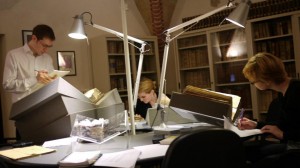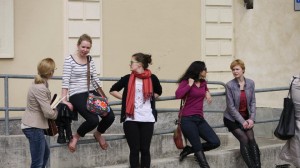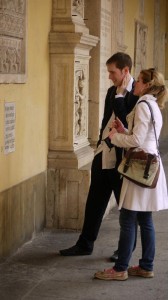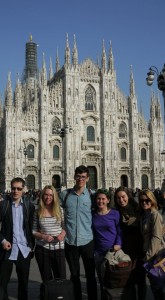I just returned from my research field trip to Vercelli, Italy. Vercelli is in the north, situated between Milan and Turin. Along with some of my classmates, I was working in the Archives at the Cathedral in Vercelli, which has quite an array of manuscripts. The primary reason why Vercelli is so important to Old English people like me is because one of the four Old English poetical manuscripts is in Vercelli. We’re not exactly sure how it ended up there, but Vercelli was one of the first major points on the Via Francigena after the Alps, and we have records of many British pilgrims being in Vercelli. The Vercelli Book is an odd assortment of poetry and homilies; it’s our only source of poetry such as ‘The Dream of the Rood’, ‘Andreas’, and ‘The Fates of the Apostles’. And yes, I got to work with it.
To be able to work with ‘one of the four’ is quite rare and, indeed, an honor. Two of the four (Nowell/Beowulf Codex and the Exeter Book) are on display, and the last one (Junius 11) is not. In order to access those three, you essentially have to be a senior scholar, and even then you might not be able to see the manuscripts. But my group was very fortunate since our guiding professor from Gottingen, Germany, is working on digitizing the Vercelli Book. Since he was with us at all times, we were able to access the Vercelli Book. It was incredible.
We were also able to access the other manuscripts in the Archive. The Archive contains primarily Latin manuscripts, and I was working with several homilies. The Archive contains a 1600 year old (yes, you read that properly) version of St. Eseubius’ Gospels, a copy of the Lombardic Law book (extremely rare), the ‘Green Gregory’, and other incredible books. I was lucky enough to work with several books that factor into my personal research, and I hope to visit Vercelli again in the near future to aid my dissertation and DPhil proposals.
Of course, since we were in Italy, we all ate. A lot. Vercelli is known for its risotto dishes, specifically one made with sausage and lard called panissa. Oh. My. It was incredible. Between all of the manuscripts, gelato, risotto, pasta, pizza, and Negronis, I’m kind of surprised that I returned to England!






